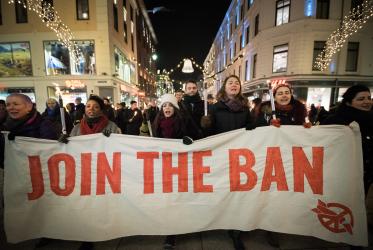By a three-to-one margin, the United Nations is authorizing negotiations to ban nuclear weapons in 2017.
The decision caps five years of rising international will to eliminate nuclear weapons because of their catastrophic effects. The UN General Assembly’s First Committee took the decision on 27 October.
Civil society organizations including the World Council of Churches (WCC) and other religious groups helped mobilize support for the vote. The ban resolution drew strong support across Latin America, Africa, Southeast Asia and the Pacific.
Governments in favor of the ban resolution came under strong negative pressure from nuclear powers, especially the USA and France. NATO countries, plus Japan, South Korea and Australia joined nuclear powers – the USA, Russia, France, UK and Israel – in the 38-state minority that voted against negotiating a ban.
“The 123 nations voting for the ban resolution represent the increasing, worldwide global determination to do what the owners of nuclear weapons have failed to do for decades, namely, to take conclusive steps to eliminate nuclear weapons,” said Peter Prove, director of the WCC Commission of the Churches on International Affairs.
Ecumenical advocates in some 20 countries lobbied for ban negotiations with their governments at home and at the United Nations, now and during the UN nuclear working group that proposed the resolution this year.
The International Campaign to Abolish Nuclear Weapons (ICAN) called the UN vote “a major step forward, marking a fundamental shift in the way that the world tackles this paramount threat.”
“For seven decades, the UN has warned of the dangers of nuclear weapons, and people globally have campaigned for their abolition. Today the majority of states finally resolved to outlaw these weapons,” said Beatrice Fihn, executive director of ICAN. WCC is a member of ICAN.
Nuclear weapons are the only weapon of mass destruction which has not been subjected to a comprehensive legal ban, as chemical and biological weapons have.
Support for the new UN resolution reflects this substantial double standard, the nuclear powers’ failure to fulfill their own obligation to get rid of nuclear weapons, and the fact that nuclear weapons exacerbate rather than address major peace and security challenges of the 21st century.
The General Assembly is scheduled to vote on the nuclear ban resolution in November.





